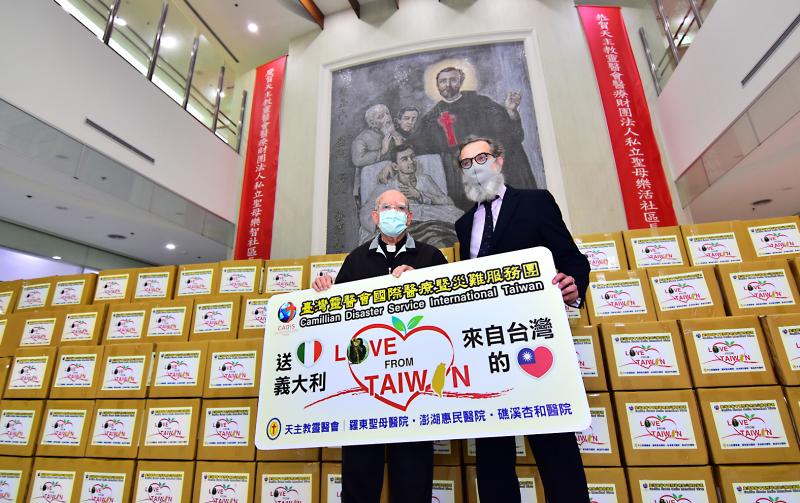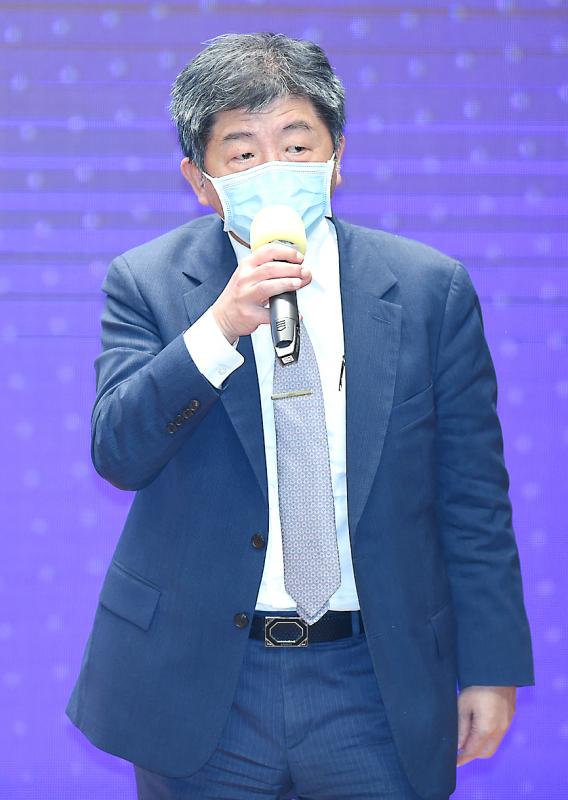The Central Epidemic Command Center (CECC) yesterday reported one new COVID-19 case, a cadet who had been aboard the navy supply ship Panshih (磐石) adding that the cadet tested positive in a second test, but had antibodies.
Between Saturday last week and Tuesday, the center reported 27 confirmed cases who were crew members of the Panshih, one of the three vessels making up a “Friendship Flotilla” that visited Palau.
After the first case was confirmed on Saturday, all 744 officers, sailors and cadets on board the three vessels were recalled for testing and ordered into quarantine for 14 days.

Photo: Chang Yi-chen, Taipei Times
From March 23, the cadet, in his 20s, started coughing, developed a fever and experienced a loss of smell, but his condition improved after taking medicine, said Minister of Health and Welfare Chen Shih-chung (陳時中), who heads the center.
The cadet tested negative after arriving at a quarantine facility on Saturday, but after having a stuffy nose and losing his sense of smell on Sunday, he was given another test, which came back positive yesterday, Chen said.
Five crew members who sought treatment for fever from the Panshih’s medical officer between March 21 and March 26 had antibody blood tests at the quarantine center, CECC advisory specialist panel convener Chang Shan-chwen (張上淳) reported on Monday, adding that three of them had antibodies, but tested negative.

Photo: Liao Chen-huei, Taipei Times
The new case was one of the people who had antibodies, but he tested positive in the second examination, Chang said.
After the body of an infected person begins to produce antibodies, the virus usually weakens, but might not immediately disappear, so there might be a period in which both the antibodies and the virus can be detected, he said.
People with the antibody and the virus are likely to test negative sometimes and positive other times — but the virus is typically more difficult to culture at this stage, so the risk of such people transmitting the virus to others is lessened, Chang said.
Asked about some countries wanting to conduct wide-scale antibody testing so that people with immunity could return to work, Chang said that the concept has a scientific base, as people with antibodies are believed to be safe from contracting the virus again.
However, whether people who have the antibody and the virus at the same time can infect others needs further study, Chang said.
So far, 28 COVID-19 cases have been confirmed among crew members of the Panshih and 692 people have been identified as having had direct contact with them, Chen said, adding that 446 of those identified have been placed in home quarantine and 246 of them were practicing self-health management.
Department of Medical Affairs Director-General Shih Chung-liang (石崇良) said that 229 Taiwanese from China’s Hubei Province and 14 crew landed in Taiwan on a “quasi-charter flight” from Shanghai at about 9:15pm on Tuesday.
One passenger had a mild fever and respiratory symptoms. They were isolated and tested, but the results came back negative, he said, adding that the other passengers were settled in quarantine facilities and received their first test.
All 231 Taiwanese who arrived on a quasi-charter flight from China’s Hubei Province on Monday evening tested negative in the first test, he added.

AGING: As of last month, people aged 65 or older accounted for 20.06 percent of the total population and the number of couples who got married fell by 18,685 from 2024 Taiwan has surpassed South Korea as the country least willing to have children, with an annual crude birthrate of 4.62 per 1,000 people, Ministry of the Interior data showed yesterday. The nation was previously ranked the second-lowest country in terms of total fertility rate, or the average number of children a woman has in her lifetime. However, South Korea’s fertility rate began to recover from 2023, with total fertility rate rising from 0.72 and estimated to reach 0.82 to 0.85 by last year, and the crude birthrate projected at 6.7 per 1,000 people. Japan’s crude birthrate was projected to fall below six,

Conflict with Taiwan could leave China with “massive economic disruption, catastrophic military losses, significant social unrest, and devastating sanctions,” a US think tank said in a report released on Monday. The German Marshall Fund released a report titled If China Attacks Taiwan: The Consequences for China of “Minor Conflict” and “Major War” Scenarios. The report details the “massive” economic, military, social and international costs to China in the event of a minor conflict or major war with Taiwan, estimating that the Chinese People’s Liberation Army (PLA) could sustain losses of more than half of its active-duty ground forces, including 100,000 troops. Understanding Chinese

US President Donald Trump in an interview with the New York Times published on Thursday said that “it’s up to” Chinese President Xi Jinping (習近平) what China does on Taiwan, but that he would be “very unhappy” with a change in the “status quo.” “He [Xi] considers it to be a part of China, and that’s up to him what he’s going to be doing, but I’ve expressed to him that I would be very unhappy if he did that, and I don’t think he’ll do that. I hope he doesn’t do that,” Trump said. Trump made the comments in the context

SELF-DEFENSE: Tokyo has accelerated its spending goal and its defense minister said the nation needs to discuss whether it should develop nuclear-powered submarines China is ramping up objections to what it sees as Japan’s desire to acquire nuclear weapons, despite Tokyo’s longstanding renunciation of such arms, deepening another fissure in the two neighbors’ increasingly tense ties. In what appears to be a concerted effort, China’s foreign and defense ministries issued statements on Thursday condemning alleged remilitarism efforts by Tokyo. The remarks came as two of the country’s top think tanks jointly issued a 29-page report framing actions by “right-wing forces” in Japan as posing a “serious threat” to world peace. While that report did not define “right-wing forces,” the Chinese Ministry of Foreign Affairs was